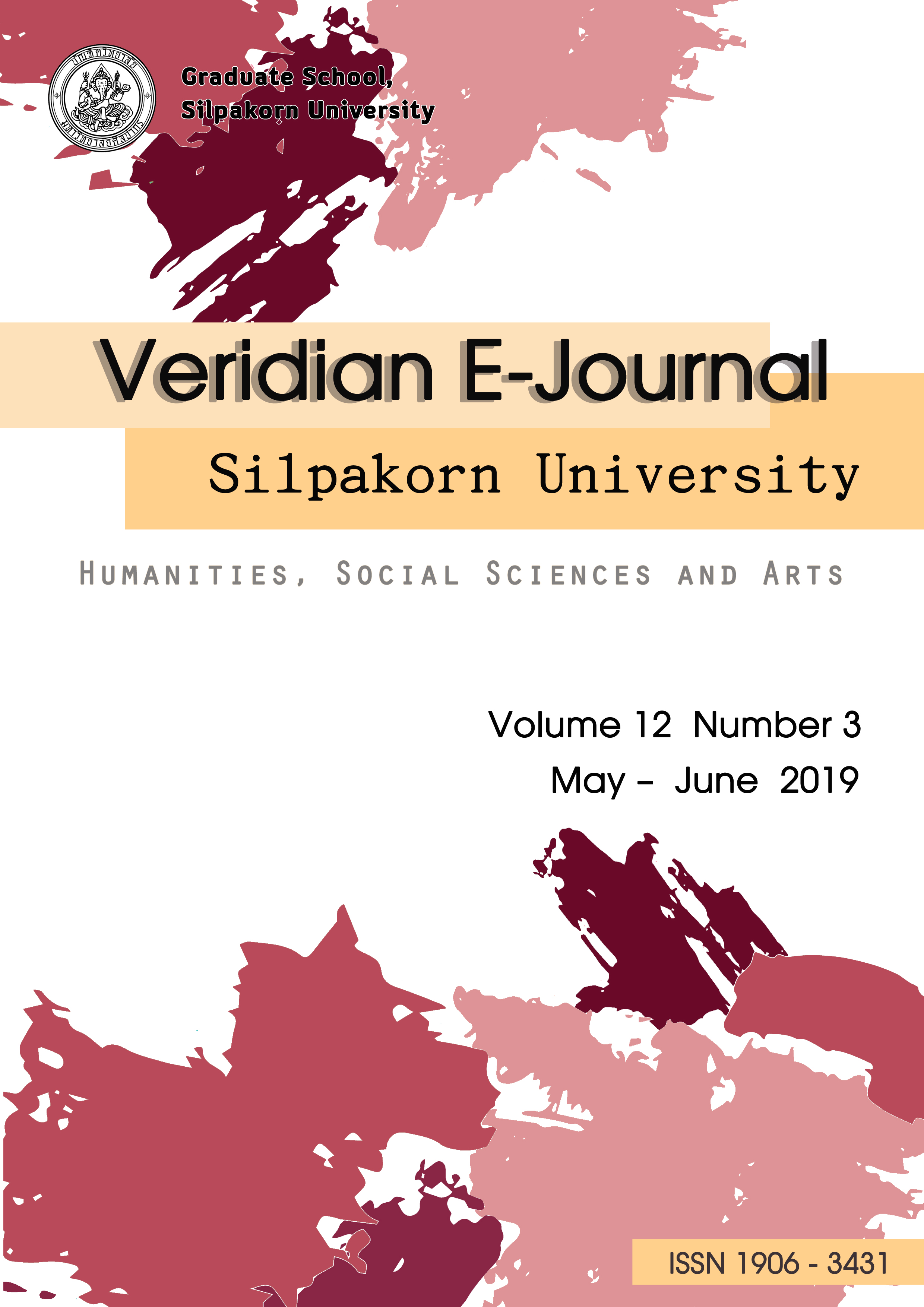Effects of Reading and Writing Persuasive Messages on Career Intention to be a Professional Farmer among High School Students in Thailand Rural
Main Article Content
บทคัดย่อ
This experimental study aimed to investigate the effectiveness of reading and writing persuasive messages on career intention to be a professional farmer in 652 high school students. The career intention consisted of the 1) intention to exploit farming knowledge (IET), 2) intention to explore farming knowledge (IER), and 3) recognition to farming learning opportunity (RLO). The results from the analysis of variance revealed the effectiveness of reading persuasive messages on all of the dependent variables. The students who read the persuasive messages reported high IET scores, high IER scores, and high RLO scores more than those who did not read. This finding was evidently in the total sample and all subgroups. For the effectiveness of writing persuasive messages on the intentions, the students who wrote persuasive message reported high IET scores, high IER scores, and high RLO scores more than the those who did not write. The findings provide valuable inputs to design effective approaches to motivate students’ career intention to be a professional farmer. They furthermore help policymakers to support new-generation citizens’ engagement in the farming occupation in Thailand.
Article Details
เอกสารอ้างอิง
Bettinghaus, E. P. (1968). Persuasive communication. New York : Holt: Rinehart and Winston.
Bhanthumnavin, D. (1988). Assessment and research on attitude. Kasertsart Educational Review, 5(1), 62–81.
Chinpinklieo, R. (1994). A Study of Relationships among Personalities and Interests in CareerSelection of Matthayomsuksa 6 Students in Chanawat Kalasin. Mahasarakham University.
Department of Provincial Administration. (2016). Official Statstics Registration Sytstems. Retrieved August 8, 2016, from https://stat.bora.dopa.go.th/stat/statnew/statTDD/
Eagly, A.H., & Chaiken, S. (1993). The Psychology of Attitude. New York: Harcourt BraceJoranovich College.
Good, D., & Michel, E. (2013). Individual Ambidexterity: Exploring and Exploiting in Dynamic Contexts. The Journal of Psychology, 147 (5), 435–453.
He, Z. L., & Wong, P. K. (2004). Exploration vs. Exploitation: An Empirical Test of the Ambidexterity Hypothesis. Organization Science, 15 (4), 481–494.
Holland, J. L. (1973). Making Vocational Choices: A Theory of Career. Englewood Cliffs, NJ: Prentice Hall.
Holland, J. L. (1997). Making vocational choices: Making Vocational Choices: A Theory of Vocational Personalities and Work Environments (3rd ed.). Lutz FL.: Psychological Assessment Resources.
Ishitani, T. T. (2010). Exploring the effects of congruence and Holland’s personality codes on job satisfaction: An application of hierarchical linear modeling techniques. Journal of Vocational Behavior, 76(1), 16–24. https://doi.org/10.1016/j.jvb.2009.06.014
Kengsakul, T. (2005). Effect of Self-persuasion and Persuasive Message on Intention to Learn English Language in Junior High School Students. National Institute of Development Administration.
March, J. G. (1991). Exploration and exploitation in organizational learning. Organization Science, 2(1), 71–87.
McGuire, W. J. (1969). The Nature of Attitudes and Attitude Change. In The Handbook of Social Psychology (2nd ed.). Cambridge: Addison and Wesley.
Mom, T. J. M., Van Den Bosch, F. A. J., & Volberda, H. W. (2007). Investigating managers’ exploration and exploitation activities: The influence of top-down, bottom-up, and horizontal knowledge inflows. Journal of Management Studies, 44(6), 910–931. https://doi.org/10.1111/j.1467-6486.2007.00697.x
Nauta, M. M. (2010). The Development, Evolution, and Status of Holland’s Theory of Vocational Personalities: Reflections and Future Directions for Counseling. Journal of Counseling Psychology, 57, 11–22.
Ng, S. C. H., Rungtusanathan, J. M., Zhao, X., & Lee, T. S. (2015). Examining process management via the lens of exploitation and exploration: Reconceptualization and scale development. International Journal of Production Economics, 163, 1–15.
Office, T. N. S. (2013). Agricultural Census. Retrieved August 8, 2016, from https://service.nso.go.th/nso/nsopublish/census/agriculture.html
Panyasakulwong, N. (2012). Effects of persuasive messages and writing message on nuclear power plant acceptance in Thai university students. National Institute of Development Administration.
Pet-in, N. (2012). Effects of persuasive messages on nuclear power plant acceptance In Thai university students. National Institute of Development Administration.
Pike., G. R. (2006). Students’ Personality Types, Intended Majors, And College Expectations: Further Evidence Concerning Psychological And Sociological Interpretations Of Holland’s Theory. Research in Higher Education, 47, No. 7, 801–822. https://doi.org/10.1007/s11162-006-9016-5
Prieto, I. M., Revilla, E., & Rodríguez-Prado, B. (2009). Managing the knowledge paradox in product development. Journal of Knowledge Management, 13(3), 157–170. https://doi.org/10.1108/13673270910962941
Rogers, M. E., Creed, P. A., & Ian Glendon, A. (2008). The role of personality in adolescent career planning and exploration: A social cognitive perspective. Journal of Vocational Behavior, 73(1), 132–142. https://doi.org/10.1016/J.JVB.2008.02.002
Schröder, E., Schmitt-Rodermund, E., Arnaud, N. (2011). Career Choice Intentions of Adolescents With a Family Business Background. Family Business Review, 24(4), 305–321. https://doi.org/https://doi.org/10.1177/0894486511416977
Seo, Y. W., Chae, S. W., & Lee, K. C. (2015). The impact of absorptive capacity, exploration, and exploitation on individual creativity: Moderating effect of subjective well-being. Computers in Human Behavior, 42, 68–82. https://doi.org/10.1016/j.chb.2014.03.031
Siamwalla, A. (2004). Senility of Agricutural Sector: Past and Future of Thai Rural. In Senility of Agricutural Sector: Past and Future of Thai Rural. Jomtien, Thailand: Symposium conducted at the meeting of Thailand Development Research Institute.
Singhato, A., Rojroongwasinkul, N., & Charoonruk, G. (2017). The Effect of Technology Acceptance Model on Behavioral Intention to Use Facebook Live : The Mediating Role of Attitude. Veridian E-Journal, 10(4), 31–43.
Suprawan, L. (2017). Effectiveness of Using Media Animation in Educating Thai Primary School Children on the Benefits of Consuming Five Colored Vegetables. Veridian E-Journa, 9(5), 159–172.
Termkunanon, S. (2010). Effect of Persuasive Message and Information on Nuclear Power Plant Acceptance of Secondary School Students. National Institute of Development Administration.
Treephan, L. (2003). A study of canonical correlation between the big seven factor Personality model and vocational interest of mathayom suksa V students. Srinakharinwirot University.
Wibulsawat, P, et al. (1985). Contemporary Social phycology. Chiang Mai, Thailand: Siam- Suksa.

